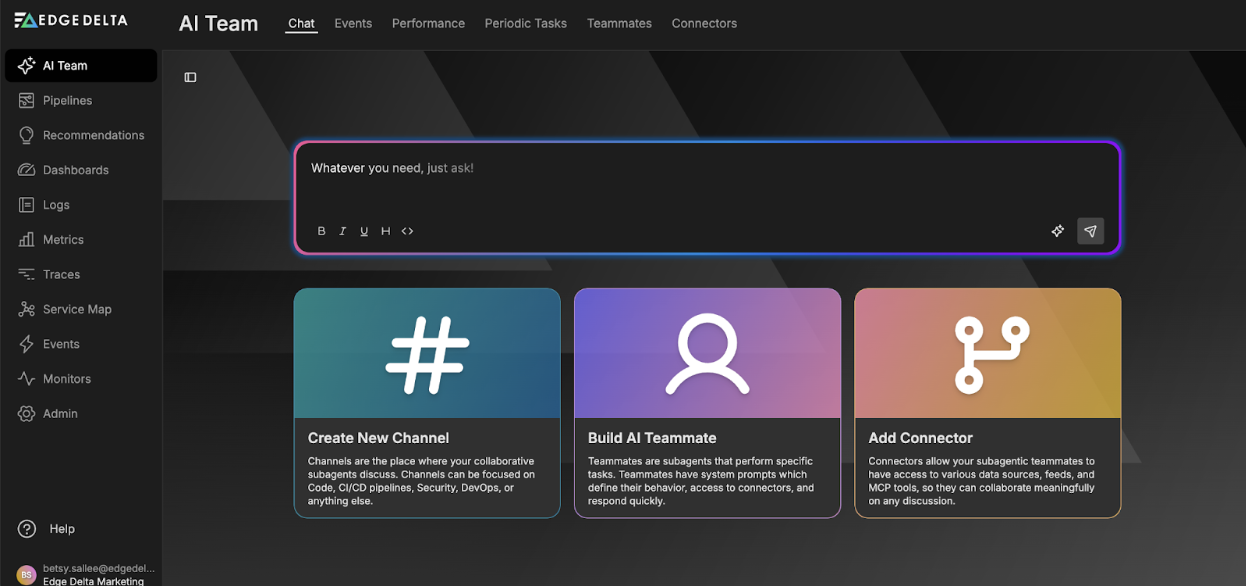The confluence of rich data sources, increased computing power, and rapid technological progress have led to huge advances in AI.
According to Gartner, 33% of the technology and service provider industry plans to invest more than $1 million into AI technologies in 2022. Additionally, 87% of these respondents believed it would streamline their operations. McKinsey’s annual research survey shows that AI investment has more than doubled since 2017, with 50% to 60% investment in recent years.
Want Faster, Safer, More Actionable Root Cause Analysis?
With Edge Delta’s out-of-the-box AI agent for SRE, teams get clearer context on the alerts that matter and more confidence in the overall health and performance of their apps.
Learn MoreContinue reading to learn more trends and insights on AI investments.
Editor’s Choice
- 33% of the technology and service provider industry plans to invest more than $1 million into AI technologies.
- By 2025, global AI investment is projected to reach $200 billion
- AI market size was projected to increase by 154% and to reach $14.7 billion.
- Tech giants secured two-thirds of the $27 billion raised by emerging AI companies.
- OpenAI tops other AI companies with a $14 billion investment.
- The United States holds the most prominent investment, with $328,548 billion.
- 83% of companies claim that using AI in their business strategies is a top priority.
- 87% plan to invest in AI in 2023. 75% of mid-sized businesses expect their revenues to increase as a byproduct.
Exploring the Latest AI Investment Statistics for 2024
AI investment is ramping up quickly. According to Goldman Sachs Economic Research, global investment in AI technologies will reach $200 billion by 2025.
Investing in generative AI offers potential economic growth and boosts labor productivity by 1% annually. Additionally, AI investment can peak as high as 2.5% to 4% of GDP in the US and 1.5% to 2.5% in other AI leaders.
Read on and learn how much companies invest in AI in this digital landscape.
From Startups to Tech Giants: How Much Are Companies Spending on AI in 2024?
Global corporate investment in AI has increased dramatically over the past decade. A Stanford University analysis estimates the sum of assets and acquisitions from minority stakes, private investments, and public offerings totaled $934.2 billion from 2013 to 2022. Recent investment peaked in 2021 at $276.1 billion with the emergence of ChatGPT.
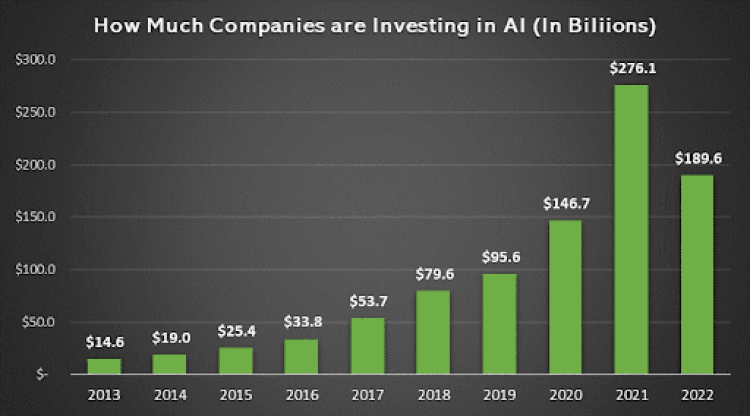
Discover how many and which companies are funding and investing in AI technology below.
1. The AI market size is projected to increase by 154%.
(Statista)
From 2018 to 2019, the AI market reached $14.7 billion—growing by 154%. Major companies like Amazon have driven most of this growth, and the rest are from startups.
Funding the growth of AI startups are companies like IntelCapital, which invested in 51 AI ventures and the 500 Startups with 45. Other notable investors like Y Combinator have backed 32 AI-centered startups. These organizations are working on software that provides:
- Natural language processing
- Machine learning
- Speech recognition
- Developments that encompass AI
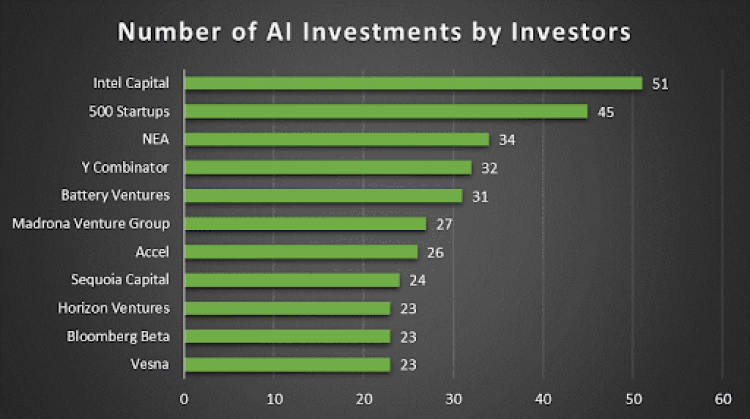
2. Big tech companies covered two-thirds of $27 billion in AI technology.
(Crunchbase, AI Supremacy)
In 2023, tech giants secured two-thirds of the $27 billion raised by emerging AI companies. The AI sector grew in 2021, but the industry needed capital and resources from established tech companies to develop products and services.
The five tech companies that have invested the most in AI startups in 2023 are Amazon, Google, Microsoft, NVIDIA, and Salesforce. Their commitment has been made directly through the leading corporation or their respective venture investing arms (e.g., Google Ventures, Microsoft’s M12, and Salesforce Ventures).
3. OpenAI obtained the highest investment among AI startup companies.
(CBCInsights, Statista)
Among the 100 most prominent AI start-ups, OpenAI sits at the top with $14 billion in capital through partnerships with Microsoft and other leading investments. Its potential market capitalization is estimated at around $80 billion.
Following OpenAI is Anthropic, which has $4.2 billion in capital, and the big data analysis platform Databricks ranks third with approximately $4 billion.
Decision-makers in companies like Amazon and Google have begun promoting AI less aggressively to their customers to set better expectations of what can be accomplished while staying within budget.
4. The US invested the most in AI, with $328,548 billion.
(AIPRM, HSToday)
Each country has invested in Artificial Intelligence, but the United States holds the most prominent investment—with $328,548 billion spent in the last five years. This is followed by China having around $195 billion in the same period. The third-placed is the UK, with $25.5 billion.
Based on the percentage of each country’s gross domestic product (GDP) spent on AI, Singapore has the highest, with $15.01 for every $1,000 of GDP.
CountryTotal investment in last 5 years (millions USD)Investment in the past 5 years (per $1,000 of GDP)
Investment compared to US investment (per $1,000 GDP)
| Country | Total investment in last 5 years (millions USD) | Investment in the past 5 years (per $1,000 of GDP) | Investment compared to US investment (per $1,000 GDP) |
|---|---|---|---|
| US | 328,548 | 12.90 | 100.00% |
| China | 132,665 | 7.39 | 57.24% |
| UK | 25,541 | 8.32 | 64.46% |
| India | 16,147 | 4.77 | 36.97% |
| Canada | 12,457 | 5.82 | 45.12% |
| South Korea | 10,348 | 6.21 | 48.16% |
| Sweden | 8,281 | 14.13 | 109.53% |
| Singapore | 7,005 | 15.01 | 116.30% |
| Estonia | 415 | 10.89 | 84.44% |
| Switzerland | 3,239 | 4.01 | 31.08% |
Read the following section and learn relevant trends on how companies invest in AI.
Analyzing the Percentage of Companies Allocating Budgets to AI
In a recent survey from Forbes, 83% of companies claim that using AI in their business strategies is a top priority. This includes leveraging automated emails and chatbots, the primary means of communication nowadays.
A Digital Information World survey also revealed that 87% of respondents planned to invest in AI in 2023. 48% of the respondents said that AI will streamline their operations. 43% plan to use AI to increase customer satisfaction, and 41% to maintain organization.
5. AI is predicted to add $6 trillion to top three industries’ GVA by 2035.
(Accenture, Exploding Topics)
The potential of AI in elevating business for economic growth accounted for 1.7%. A survey was conducted comparing 16 industries in a baseline and AI scenario by 2035.
It revealed that information and communication, manufacturing, and financial services obtained the top GVA growth rates – 4.8%, 4.4%, and 4.3%, respectively. This translates to an additional $6 trillion GVA in 2035 for the three sectors alone.
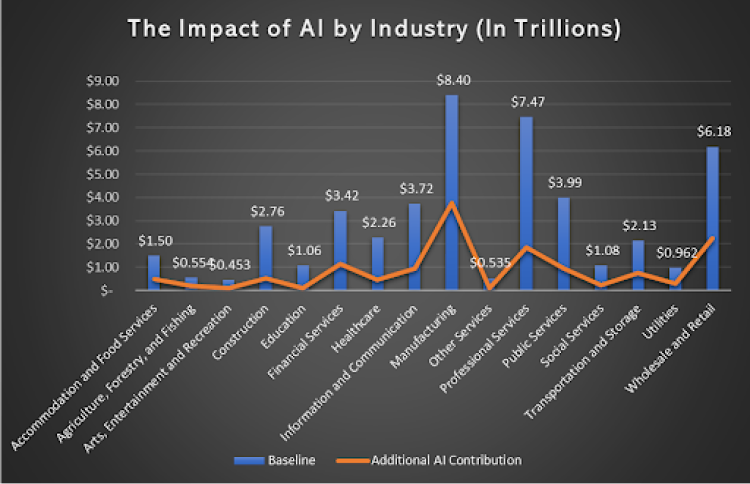
GVA Definition
Gross value added (GVA) is an economic metric that measures the value of goods and services produced in an area, industry, or sector of an economy. This measure is useful for comparing regions’ or sectors’ productivity and economic health.
Note: It is calculated by subtracting the cost of inputs and raw materials from the total value of the output.
6. AI investment surges to $142.3 billion in 2023 due to growing startup funding and corporate interest.
(Statista)
Global corporate AI investment reached $92 billion in 2022, a six-time increase compared to 2016. This shows how AI is becoming more significant in business operations.
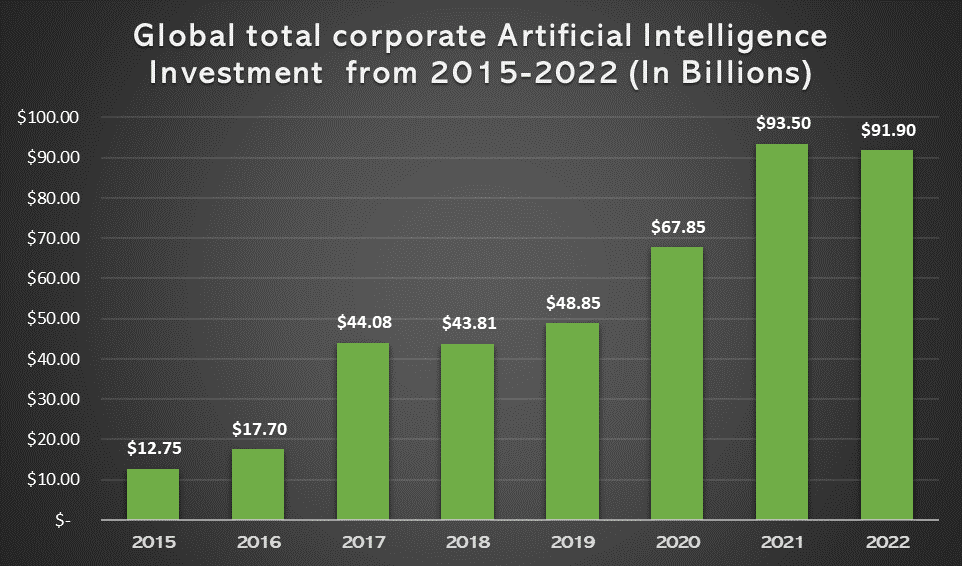
In 2023, the global AI market garnered $142.3 billion, and it is growing due to the influx of investments. Additionally, AI startups have nearly doubled their investments by $5 billion. Funding is expected to grow to trillions as businesses start to focus on the following:
- Machine learning
- Chatbots
- Machines with human interface
7. Machine Learning leads AI investments with 62% share.
(Mckinsey, Priceonomics)
Many companies use different types of AI in their operations. Among the types, machine learning obtained the highest investment—with 62%. It holds a more significant gap in second place, computer vision, with 31%.
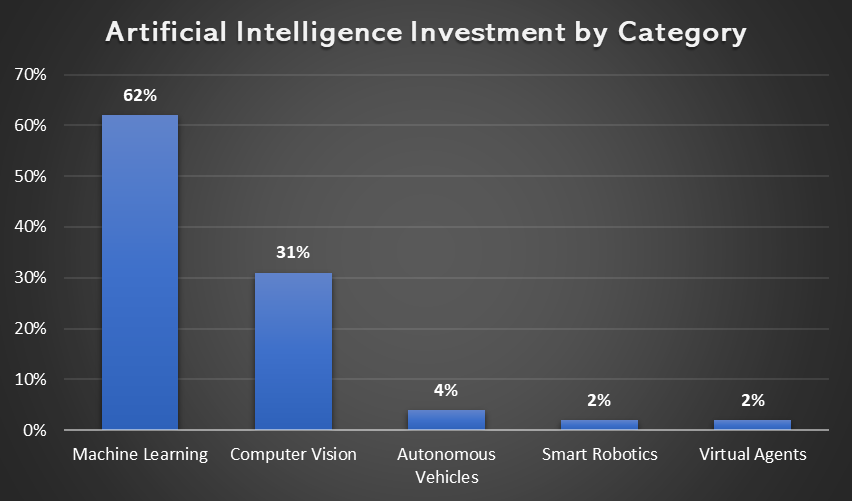
The growing preference for machine learning reflects its broad utility to enhance tasks like data analysis and predictive modeling, which drives higher investments. Most companies prioritize machine learning for its potential to deliver substantial returns on investment through improved efficiencies and innovation.
Conclusion
Investment in Artificial Intelligence has become rampant. AI’s anticipated market value of $200 billion by 2025 is a testament that more tech companies are investing and adopting AI for their business operation.
For businesses and professionals, embracing AI technologies means staying ahead of the curve and shining among competitors. AI’s continuous learning and adaptability are vital to thriving in the modern business environment.
FAQ on AI Investments
Is it good to invest in AI companies?
Yes, AI in companies is a good investment because this technology can offer high returns.
Why are companies investing in AI?
Companies invest in AI because for several reasons. First, AI tools can help companies build competitive advantage by automating processes, driving efficiency, and enabling data-driven decision making. Second, AI can help companies drive innovation, since the technology can enable both novel and disruptive products and services.
How much do companies invest in AI?
Globally, companies have invested $276.1 in 2021.







